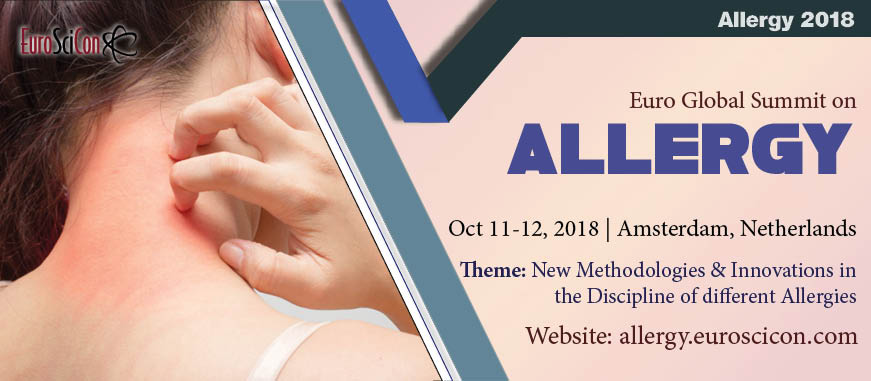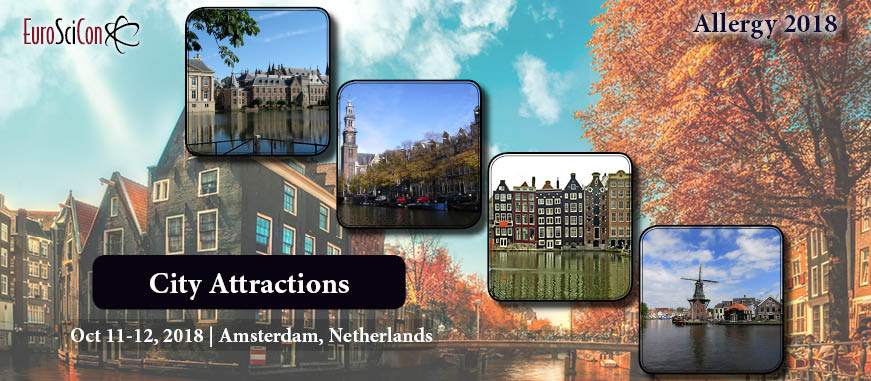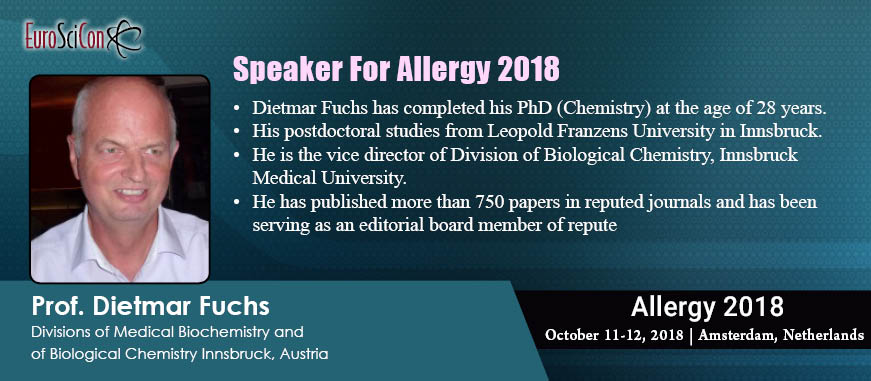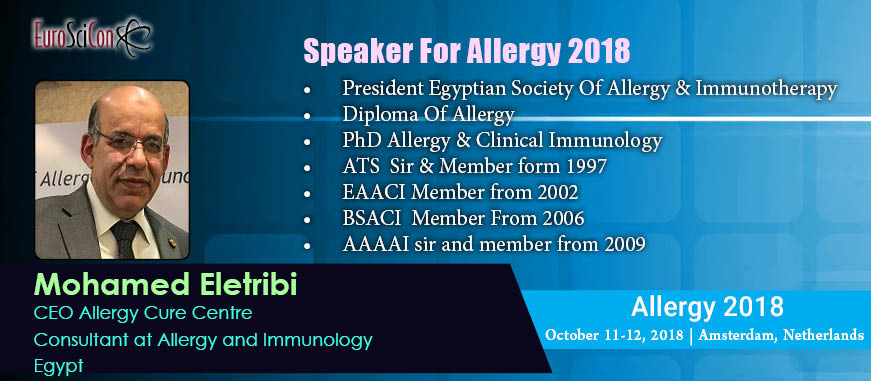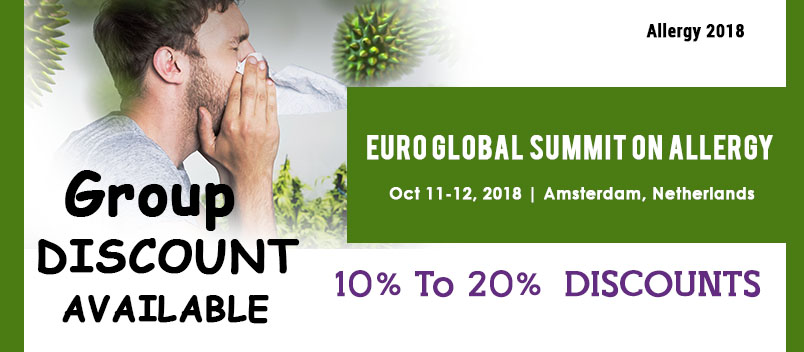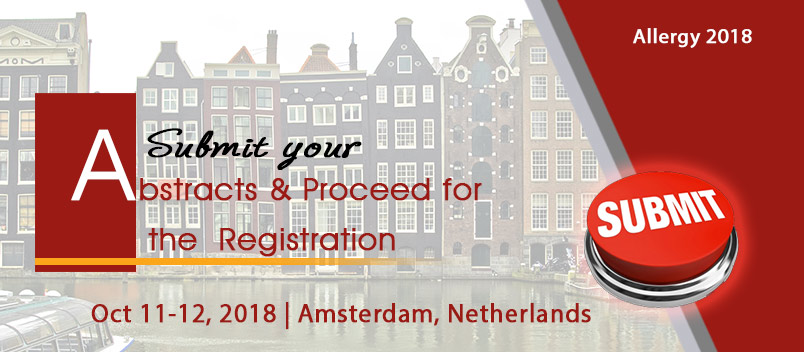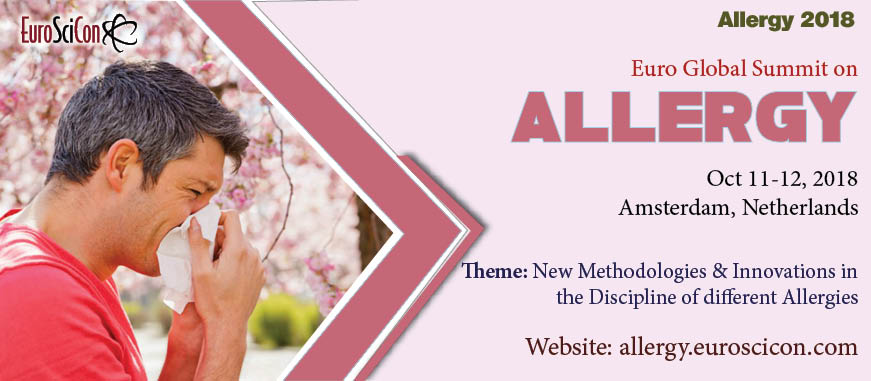Allergy 2018
About Conference
The Euroscicon is inviting for Euro Global Summit on Allergy and exhibition on Allergy 2018 on Oct 11-12, 2018 Amsterdam, Netherlands. The theme of this year’s meeting is “ New Methodologies & Innovations in the Discipline of different Allergies” which will provide an international platform for discussion of present and future challenges in Allergy techniques, future of Allergy. World-leading health practitioners, educators and researchers will present cutting-edge and practical Allergy techniques based upon widely accepted evidence and will introduce new and emerging research
What’s new?
The Allergical Research has moreover set itself the undertaking of working on numerous levels to set up activities gone for improving collaborations between researchers in fundamental and clinical research and to encourage interdisciplinary research exercises. On an instructive level, the exploration bunch goes for supporting the training and direction of youthful researchers by giving amazing preparing chances to PhD understudies and postdoctoral colleagues. It additionally gives a chief interdisciplinary stage to specialists, professionals and teachers to display and talk about the latest developments, patterns, and worries and in addition useful difficulties experienced and arrangements embraced in the fields of Current Trends in Allergy Techniques
About Venue
Amsterdam is the capital of Netherlands. Amsterdam is a city that's rich in the visitor sights. It has many ancient churches and many magnificent museums as well. As the commercial capital of the Netherlands and one of the top financial centers in Europe. Amsterdam offers a lot more, like the world-class Van Gogh museum, the Rijksmuseum and shopping on nine little streets. Families may enjoy a visit to the Nemo Science museum and Vondalpark So pack your bag, pick up a camera and get ready for an adventure in Amsterdam!!
As the business capital of the Netherlands and one of the best budgetary focuses in Europe, Amsterdam is viewed as an alpha world city by the Globalization and World Cities (GaWC) ponder gathering. The city is likewise the social capital of the Netherlands. Numerous extensive Dutch organizations have their central command there, and seven of the world's 500 biggest organizations, including Philips and ING, are situated in the city. Amsterdam was positioned second best city to live in by the Economist Intelligence Unit and the twelfth on nature of living for condition and foundation by Mercer. The city was positioned third in development by Australian advancement office in their Innovation Cities Index 2009.The Amsterdam seaport right up 'til the present time remains the second in the nation, and the fifth biggest seaport in Europe. Well known people groups of the Amsterdam are the diarist Anne Frank, craftsmen Rembrandt van Rijn and Vincent van Gogh, and thinker Baruch Spinoza.
Why to attend
Allergy meetings gives a worldwide stage to worldwide systems administration and trading recent advancements in Allergy Techniques , offering chance to go to the introductions conveyed by eminent specialists from everywhere throughout the world. With individuals from around the globe concentrated on finding out about Allergy and its advances. This is your best chance to achieve the biggest collection of members from the Allergy group. Direct introductions, disseminate data, meet with present and Potential researchers, make a sprinkle with new medication improvements, and get name acknowledgment at this 2-day event. Widely acclaimed speakers the latest systems, advancements, and the most up to date refreshes in allergy are signs of this gathering.
TRACKS
Asthma :
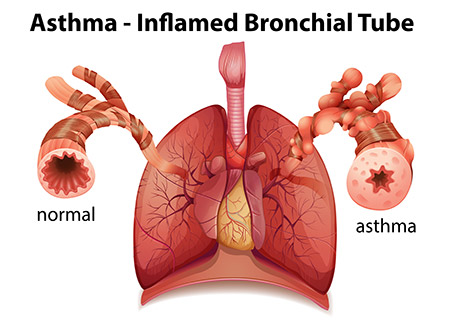
Asthma is a chronic condition that effects lungs & causes inflammation and constricting of the bronchial tubes, the pathways that allow air to enter and leave the lungs. If people with asthma are unveiled to a substance to which they are sensitive or a situation that changes their regular breathing patterns, the symptoms can become more severe. There are two types of asthma: allergic (caused by exposure to an allergen and non-allergic (caused by stress, exercise, illnesses like a cold or the flu, or exposure to extreme weather, irritants in the air or some medications).
- Asthma Medications: Common & Advanced
- Asthma And Pregnancy
- Asthma Attacks
- Treatment For Asthma
- Asthma And Advanced Asthma Treatment

Irritated skin can be caused by a many factors. These include immune system disorders, medications and infections. When an allergen is responsible for initiating an immune system response, then it is an allergic skin condition. When skin is contacted by a substance, body’s immune system is triggered thinking the substance as a foreign agent, because of this skin becomes sensitive & develops allergy. Contact with substance such as detergents, soaps or cleaning supplies causes skin allergy.
- Atopic Dermatitis: Eczema
- Allergic Contact Dermatitis
- Urticaria
- Angioedema
- Cutaneous Mastocytosis
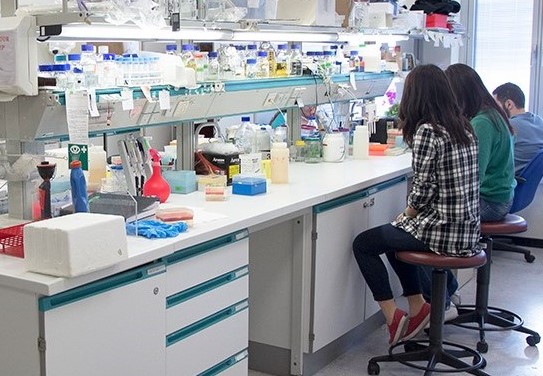
Clinical Allergy is a branch of Immunology which deals with clinical disorders at the molecular and cellular levels. Allergy involves an exaggerated response of the immune system, often to common substances such as foods or pollen. The immune system is a complex system that normally defends the body against foreign invaders, such as bacteria and viruses, while also surveying for conditions such as cancer and autoimmunity. Allergens are substances that are foreign to the body and that cause an allergic reaction.
- Auto Immunity & Auto Immune Diseases
- Immune Manipulation
- Cellular Immunology
- Tumor Immunology
- Clinical Immunology Techniques
- Transplantation
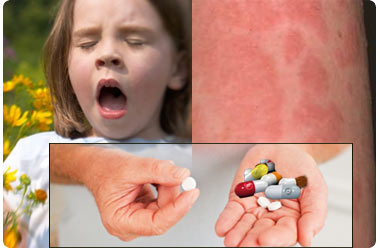
Drug allergies are a set of symptoms caused by an allergic reaction to a drug. A drug allergy encompasses an immune response in the body that develops an allergic reaction to a medicine. If you develop a rash, hives or difficulty breathing after taking certain medications, you may have a drug allergy. As with other allergic reactions, these symptoms of drug allergy can occur when your body’s immune system becomes sensitive to a substance in the medication, identifies it as a foreign invader and releases chemicals to defend against it.
- Drug Allergy: Clinical Aspects & Diagnosis
- Drug Allergy Or Side Effects
- Drug Allergy: Anaphylaxis
- Clinical Diagnosis Of Drug Allergy
- Drug Hypersensitivity
- Pharmacogenomics
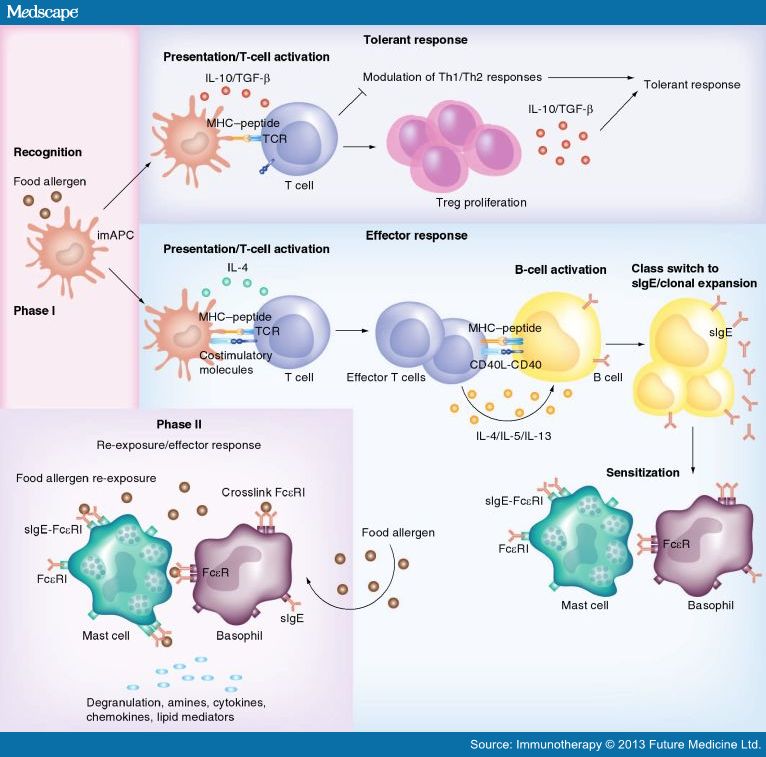
Food allergy is caused when the body falsely makes an antibody (IgE) to fight against a specific food. When the food is next (or sometimes is just in contact with the skin) it provokes an immune system response which results in the commute of histamine and other substances in the body. These cause various symptoms, depending on where in the body they are exposed.
- Anaphylaxis
- Epidemiology & Mechanisms
- Diagnosis & Management
- Food Allergy Vs. Food Sensitivities
- Immunological Aspects Of Food Allergy

Dermatology methods can enhance the presence of the skin by adjusting skin defects, for example, skin inflammation, scars, and wrinkles. Dermatologists can likewise treat skin conditions that may not really be destructive, but rather can influence or even deform the appearance. Dermatologic surgery manages the analysis and treatment of restoratively fundamental and corrective states of the skin, hair, nails, veins, mucous layers and neighbouring tissues by different surgical, reconstructive, restorative and non-surgical strategies
- Cosmetic dermatology
- Dermatopathology
- Immunodermatology
- Paediatric Dermatology
- Dermatoepidemiology
- Contagious Skin diseases
Prevention, Risk factors & Treatment :
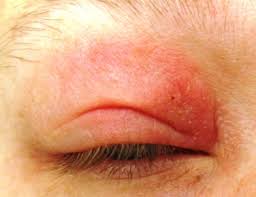
Allergies can be prevented by identifying & avoiding the ones which cause allergy to the body. One of the biggest causes of allergy is house dust mites, pets, mould spores, food allergies, insect bites stings, when trying to identify what causes or deteriorate your allergic symptoms, track your activities and what you eat, when symptoms occur and what seems to help. Host factors responsible for risk of allergy are heredity, sex, race and age. Exposure to allergens has been identified as an influential environmental factor, whereas passive smoking and pollution may act as an adjuvant.
- Allergy Epidemiology
- Risk Factors For Causing Allergy
- Preventive Methods Of Different Types Of Allergies
- Treatments And Therapies For Allergy
- Advanced Allergy Treatment
Allergy Diagnosis & Medicine :

Allergic diseases are the outcome of allergic inflammation that occurs as a result of an interaction between the environment and the patient's immune system resulting in the release of histamine and other pro-inflammatory mediators. Knowing exactly what body is allergic to can help lessen or prevent exposure and treat the reactions. Laboratory investigations are a useful tool in the diagnosis and management of allergic diseases and can provide aids to diagnose and assess disease activity.
- Molecular Allergy
- Laboratory Tests For Allergy
- Allergens: Diagnosis
- Advances In Allergy Medicine
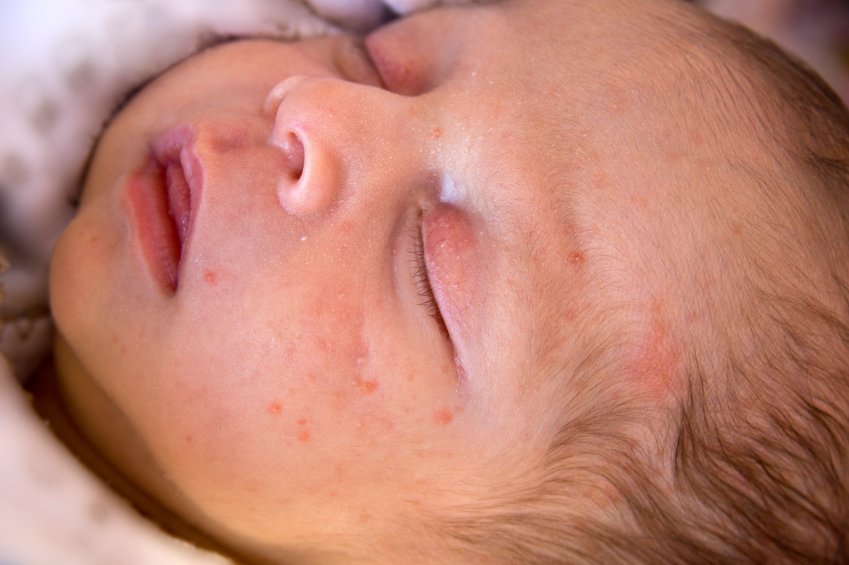
Allergies are among the most common conditions affecting children. When the immune system of a child having an allergy, wrongly reacts to factors that are usually harmless; pet dander, pollen, dust, mold spores, insect stings, food, and medications are examples of such things. This reaction may cause their body to reciprocate with health problems such as asthma, hay fever, hives, eczema (a rash), or a very severe and unusual reaction called anaphylaxis.
- Paediatric Asthma And Rhinitis
- Fetal & Neonatal Immunology
- Paediatric Infections
- Outdoor & Indoor Allergens
Biomarkers for Allergy, Asthma & Clinical Immunology :
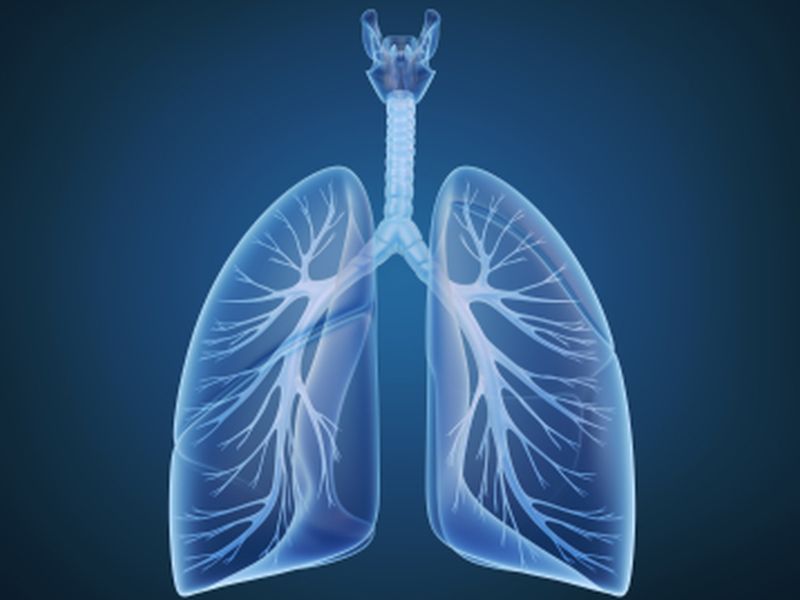
A biological marker is a physical sign or laboratory measurement that can function as a sign of biological or pathophysiological processes or as a riposte to a therapeutic intervention. Determining IgE of IgG in serum has been proved to be too unresponsive and too non-specific to identify individuals with sensitization, with and without clinical symptoms. In order to develop new diagnostic tools, it is relevant to search for markers that are strongly conjoin with allergy or tolerance. So the biomarkers can be used as diagnostic tools.
- Genetic Biomarkers
- Protein Biomarkers
- Basophil Activation As A Biomarker Of Food Allergy And Asthma
- T-Regulatory Cells As Markers Of Allergen Immunotherapy
- Recent Advancements In Biomarkers Of Allergy
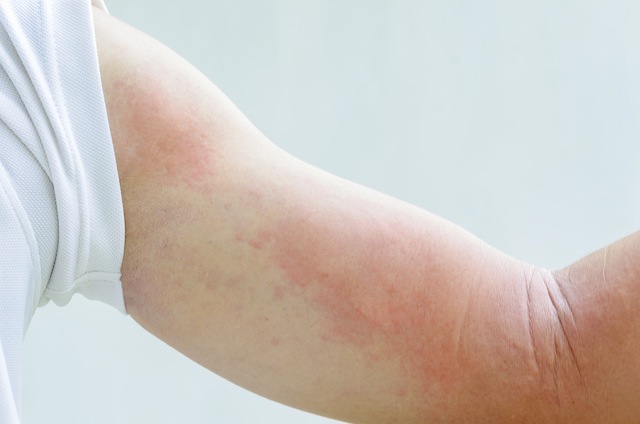
Sensitivity and immunology includes the administration of scatters identified with the safe framework. These conditions extend from the exceptionally normal to the extremely uncommon, spreading over all ages and including different organ frameworks. Illnesses regularly observed by an allergist/immunologist (frequently alluded to just as an "allergist") Allergic infections of the eye, for example, hypersensitive conjunctivitis. Respiratory tract-related conditions, for example, unfavourably susceptible rhinitis, sinusitis, asthma, excessive touchiness pneumonitis and word related lung infections.
- Allergic Diseases
- Respiratory Tract-Related Conditions
- Gastrointestinal Disorders Caused By Immune Responses
- Skin-Related Allergic Conditions Such As Atopic Dermatitis
- Adverse Reactions
- Diseases Associated With Autoimmune Responses To Self-Antigens
Autoimmunity and Inflammation :
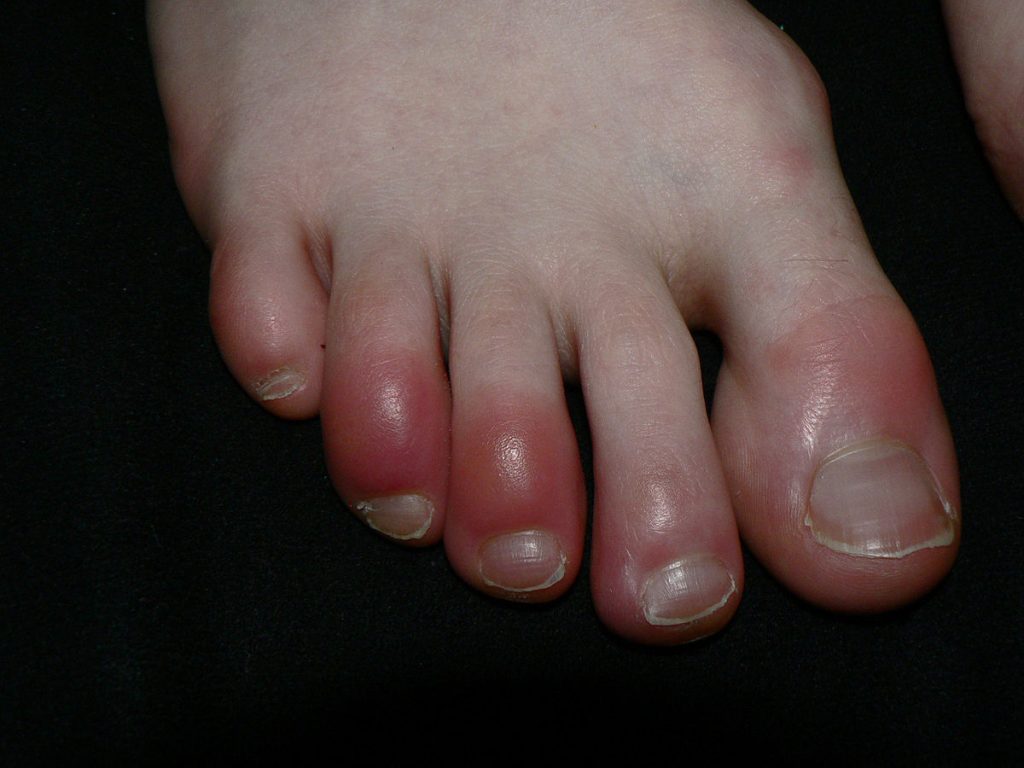
The term autoimmunity refers to a failure of the body’s immune system to identify its own cells and tissues as “self”. Instead, immune responses are launched against these cells and tissues as if they were foreign or invading bodies. Inflammation is a process by which the body's white blood cells and substances they produce protect us from infection with foreign organisms, such as bacteria and viruses.
- Autoimmunity In Dermatology
- Cancer And Autoimmunity
- Epigenetic Control Of Autoimmune Diseases
- Process Of Acute Inflammation
- Auto Inflammatory Diseases
- Resolution Of Inflammation
- Advances In Cellular Immunology
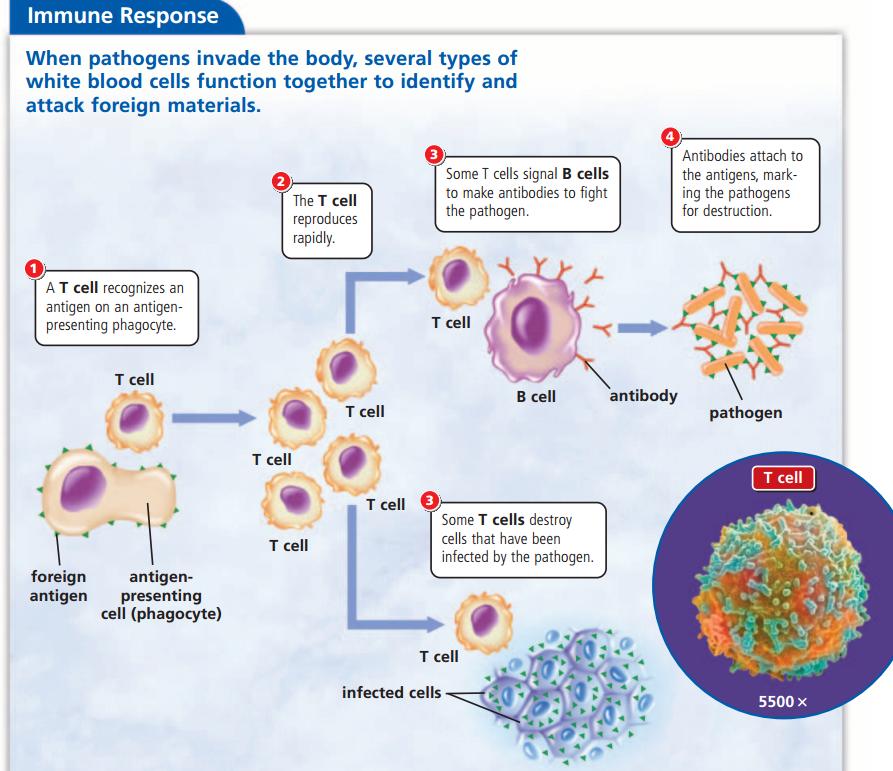
The Immune system is made up of cells, tissues, and organs that work together to defend against germs. The role of the immune system is to protect against disease or other potentially damaging foreign bodies. It also protects the host from a group of pathogenic microbes that are themselves constantly evolving. The immune system helps the host to eradicate toxic or allergenic substances that enter through mucosal surfaces.
- The Tasks Of The Immune System
- The Immune Response
- Immunity
- Immune System Disorders
- Components Of Immune System
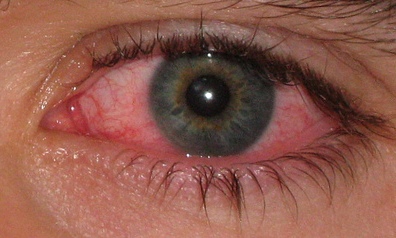
The eye, like the respiratory tract, can be a site of acute allergic reactions. Ocular allergy also called Allergic conjunctivitis occurs when something allergic to irritate the conjunctiva. This is the sensitive membrane covering the eye and the inside of the eyelid. As all allergies, allergic conjunctivitis starts when the immune system recognises an otherwise innocuous substance as an allergen. This causes your immune system to overreact and produce antibodies called Immunoglobulin E (IgE). These antibodies drive to cells that release chemicals which cause an allergic reaction. In this case, allergic reactions include eyes that water, itch, hurt or become red or swollen.
- Epidemiology
- Ocular Immune System
- Corneal Immunology
- Allergic Diseases Of Conjunctiva & Cornea
- Diagnostic Tests For Ocular Allergy
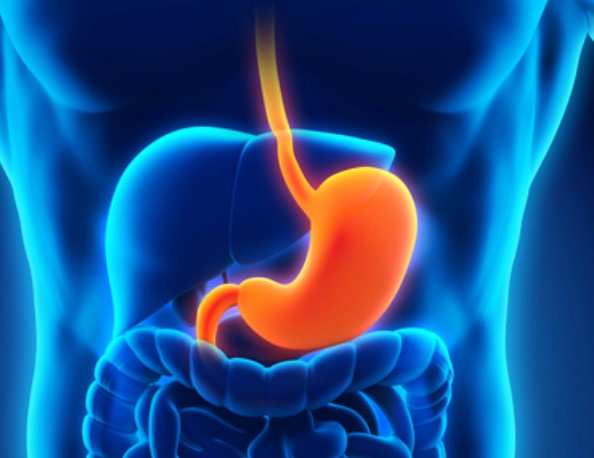
Gastrointestinal tract is a lymphoid organ, and the lymphoid tissue within it is referred to as the gut-associated lymphoid tissue or GALT. Gastrointestinal allergy is an immediate hypersensitivity reaction of the digestive system after the ingestion of certain foods or drugs. GI allergy varies from food allergy, which can affect other organ systems. Distinctive symptoms constitute itching and swelling of the mouth and oral passages, nausea, vomiting, diarrhoea, severe abdominal pain, and in severe cases, anaphylactic shock.
- Mucosal Immunology
- Gastrointestinal Inflammation
- Inflammatory Bowel Disease
- Intestinal Infections
- Food Allergens
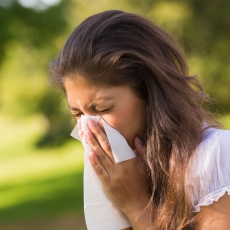
Allergies are one of the most common chronic diseases. A chronic disease lasts a long time or occurs often. An allergy occurs when the body’s immune system sees a substance as harmful and overreacts to it. The substances that cause allergic reactions are allergens. When someone has allergies, their immune system makes an antibody called immunoglobulin E (IgE). These antibodies respond to allergens
- Types Of Allergens
- Symptoms Of Allergies
- Diagnose Allergies
- Treatments For Allergies
- Prevent-Allergic Reaction
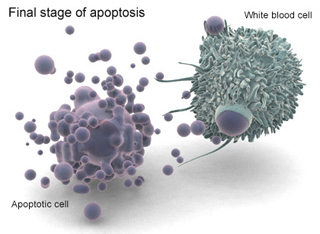
Cellular Allergy distributes unique examinations worried with the immunological exercises of cells in test or clinical circumstances. The response to pathogens is created by the collaborations and exercises of the substantial number of assorted cell sorts required in the insusceptible reaction
- Pattern Acknowledgment Receptors And Cell Encapsulation
- Cellular Antioxidant Activities
- B-Cell And T-Cell Receptors
- Cellular Automata And Specialist Based Models
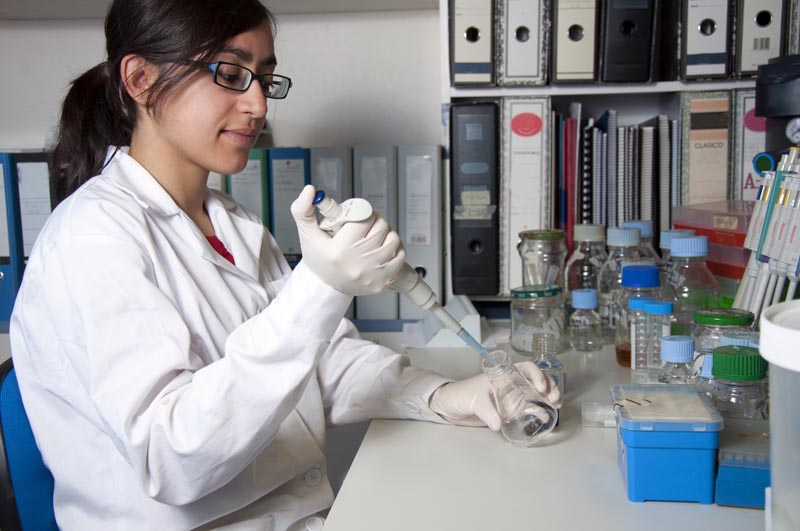
Toxicological Allergy is the study of immune dysfunction resulting from exposure of an organism to a xenobiotic. The immune dysfunction may take the form of immunosuppression or alternatively, allergy, autoimmunity or any number of inflammatory-based diseases or pathologies. Because the immune system plays a critical role in host resistance to disease as well as in normal homeostasis of an organism, identification of immunotoxic risk is significant in the protection of human, animal and wildlife health
- Immunogenicity Assessment For Protein
- Immunosuppression
- Developmental Immunotoxicology DIT
- Immunotoxicity Evaluation Of Novel Drug Candidates
Food and Agricultural Allergy :
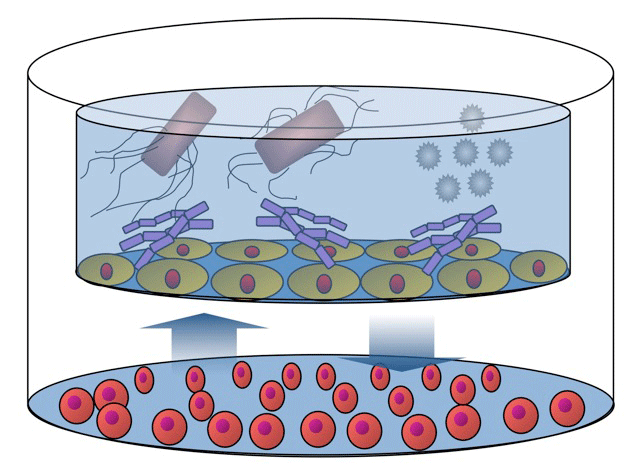
Food Sensitiities are expanding in the predominance at higher rate than can be clarified by hereditary components, recommending a part for up till now unidentified ecological variables. The intestinal epithelium shapes the interface between the outer condition and the mucosal invulnerable framework, developing information recommend that the collaboration between intestinal epithelial cells and mucosal dendritic cells is of specific significance in deciding the result of safe reactions to dietary antigens. Presentation to sustenance allergans through non-oral courses, specifically through the skin, is progressively perceived as a conceivably imperative factor in the expanding rate of nourishment sensitivity. They are many open enquiries on the part of natural elements, for example, dietary variables and micro biota, in the improvement of nourishment hypersensitivity, however information recommend that both have an essential modulatory impact on the mucosal insusceptible framework.
- Development Of Diagnostic Systems
- Ligand Based Assays
- Application Of Ligand Based Assays
- Food Allergy Or Sensitivity To Agricultural Chemicals
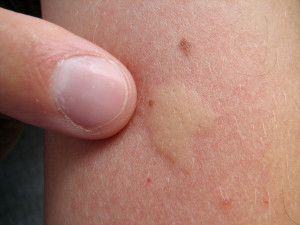
Infection occurs when organism is attacked by disease causing agent, they multiply in the host body & produce toxins. Infection may remain localized or it can be spread through blood or lymphatic vessels to overall body. Infections are caused by infectious agents like virus, viroid, bacteria, prions etc. Host body fights infections by provoking immune system. Infections can be treated by medications like antibiotics, antivirals, antifungals etc.
- Bacterial & Viral Infections
- Diagnosis Of Infectious Diseases
- Sexually Transmitted Infections
- Role Of Igg On Allergy
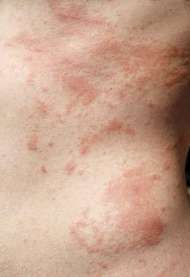
Hypersensitive responses happen when a person who has delivered IgE counter acting agent because of a harmless antigen, or allergen, in this way experiences a similar allergen. The allergen triggers the enactment of IgE-restricting pole cells in the uncovered tissue, prompting a progression of reactions that are normal for hypersensitivity. Excessive touchiness depicts the insusceptible reaction that is propelled against a harmless antigen, which in unaffected people, would not regularly be immunogenic.
- The Production Of Ige
- Types Of Hypersensitivity & Immuno Complexes
- Types Of Allergies
- Effector Mechanisms In Allergic Reactions
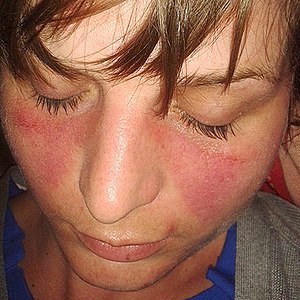
An immune system illness is a condition in which your insusceptible framework erroneously assaults your body. The invulnerable framework ordinarily makes preparations for germs like microorganisms and infections. When it detects these remote trespassers, it conveys a multitude of contender cells to assault them. Normally, the insusceptible framework can differentiate between outside cells and your own cells. In an immune system infection, the invulnerable framework botches some portion of your body like your joints or skin as outside
- Immunodeficiency Diseases
- Cancer And Autoimmunity
- Cytokine Governance Of Tolerance And Inflammation
- Inflammatory Bowel Diseases (IBD) & Gastroenterology

Immunotherapy is an exceptionally dynamic territory of tumour research. Numerous researchers and specialists around the globe are concentrating better approaches to utilize immunotherapy to treat disease. Some of these are talked about here. Immunization is a natural readiness that enhances insusceptibility to specific illness. It contains specific specialists that looks like a sickness causing microorganism as well as empowers body's resistant framework to perceive the remote operators
- Advancements In Vaccine Development, Novel Tools- Machinery Used
- Next-Generation Conjugate Vaccines
- T Cell Based Immunotherapies And Vaccines
- Immunotherapy For Autoimmune Diseases
- Vaccine Adjuvants
- Development Of Prophylactic Vaccines Against Cancer And Infectious Diseases
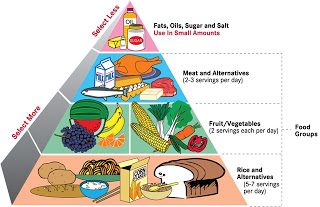
Nutritional Allergy gone for seeing how eat less carbs and nutritious variables impact the resistant reactions, in this manner directing wellbeing and malady results. Past giving fundamental supplements, eating routine can effectively impact the resistant framework. Actually happening mixes like linoleic corrosive, abscisic corrosive, polyunsaturated unsaturated fats, resveratrol, curcumin, limonin, Vitamin E, Vitamin An, and Vitamin D regulate insusceptible reactions.
- Obesity, Inflammation And Immunity
- Nutrient-Gene Interactions In The Immune System
- Nutrition-Inflammation Interactions
- Early Life Nutritional Influences On The Immune System
- White-Brown Adipocyte Plasticity And Inflammation
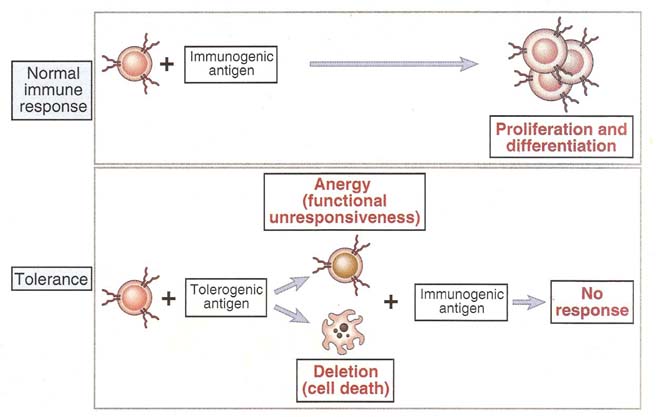
Immunological resistance is the inability to mount a safe reaction to an antigen. It can be: Natural or "self" resilience. This is the disappointment (something to be thankful for) to assault the body's own particular proteins and different antigens. In the event that the insusceptible framework ought to react to "self", an immune system ailment may result.
- Immune Homeostasis: Immunity Versus Tolerance
- Transplant Rejection And Engraftment
- B Cell Differentiation Pathways And Disease Susceptibility
- Next Generation Immune-Based Therapies
- Tolerance In Physiology And Medicine
- Tissue Specific Autoimmunity
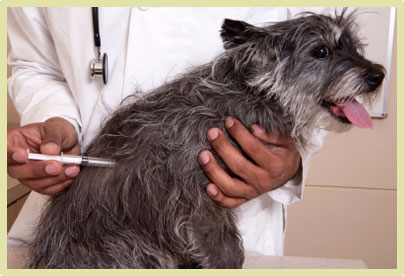
Veterinary Allergy manages the investigation of veterinary immunology and immunopathology as connected to creatures, especially rural and sidekick creatures and also natural life (examines on species which are more primitive than fish won't be considered). It reports essential, relative and clinical immunology explore contemplates relating to these creature species including: science of cells and components of the resistant framework, immunochemistry, immunodeficiencies, immunodiagnosis, immunogenetics, immunopathology, immunology of irresistible illness and tumors, immunoprophylaxis to irresistible ailment including immunization advancement and conveyance, immunological parts of pregnancy including detached invulnerability.
- Abnormalities In Immune System
- Cardiac Immunopathology
- Neurological Immunopathology
- Respiratory Immunopathology
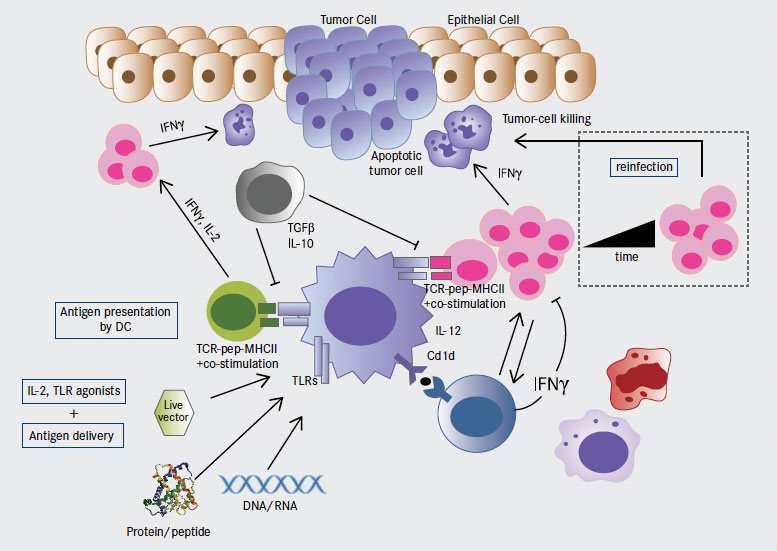
Immunotherapy is the treatment of disease by enhancing, inducing or suppressing an immune response. It has gained great interest among researchers, clinicians and pharmaceutical companies, particularly in its promise to treat various forms of cancer. With thousands of patents filed annually on the subject, it is estimated that there are thousands of immunotherapy licensing opportunities across technology transfer offices that are in need of development and commercialization partners. Immunomodulatory regimens often have fewer side effects than existing drugs, including less potential for creating resistance when treating microbial disease.
- Activation Immunotherapy
- Suppression Immunotherapy
- Helminthic Immunotherapy
- Others
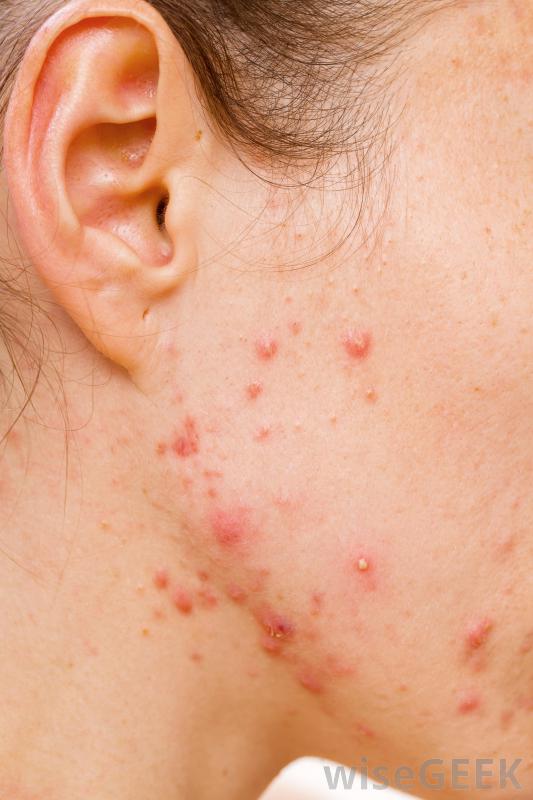
Immunodermatology is a medical specialty that focuses on the diagnosis and treatment of skin disorders characterized by defective responses of the body's immune system. Immunodermatology testing is essential for the correct diagnosis and treatment of many diseases affecting epithelial organs including skin, mucous membranes, gastrointestinal and respiratory tracts. Immunodermatology is fundamental for the right analysis and treatment of numerous maladies influencing epithelial organs including skin and oral, genital, and visual mucous films, gastrointestinal and respiratory tracts.
- Cutaneous Dendritic Cells In Health And Disease
- Angiogenesis For The Clinician
- Atopic Dermatitis
- Nonmelanoma Skin Cancer
- Immunobiology & Immune-Based Therapies
- Clinical Dermatology
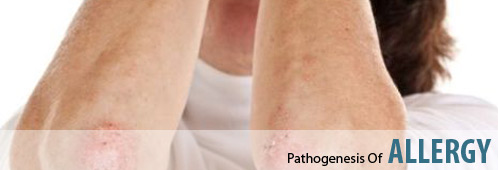
Pathogens Allergy describes the process by which an infection leads to disease. Cells of the immune system recognize and abolish pathogenic organisms and derived toxins. Immunity is provided by cells of the innate and adaptive arms of the immune system. Pathogenesis includes microbial infection, inflammation, malignancy and tissue breakdown.
- Immunity & Pathogenesis
- Haemorrhagic Fevers And Pathophysiology
- Super Antigens: Staphylococcus And Streptococcus
- Macrophages; The Hosts
- Sepsis & Its Pathophysiology
- Lymphocyte Apoptosis

Aesthetic medicine is an inclusive term for specialties that focus on improving cosmetic appearance through the treatment of conditions including scars, skin laxity, wrinkles, moles, liver spots, excess fat, cellulite, unwanted hair, skin discoloration, and spider veins. Traditionally, aesthetic medicine includes dermatology, reconstructive surgery and plastic surgery. Its primary purpose is to improve a person's looks by reducing or eliminating imperfections. The major benefit is that these are painless procedures.
- Cosmetic Surgery
- Bariatric surgery
- Breast surgery
- Facial cosmetic surgery
- Nanotechnology in cosmetic dermatology

Cosmetics are generally products or substances that you apply on your skin. They include moisturizers, hair conditioners, nail polish, perfumes, emulsifiers and pigments among others. Different cosmetics contain different ingredients including inert materials, botanical substances, and essential oils among others. Cosmetology is the study and application of beauty treatment. Specialties include a lot of practices including skin care, cosmetics, hairstyling, manicures and pedicures, and electrology.
- Cosmetics and skin care
- Natural and safer approaches to skin and hair care
- Current Research in cosmetology
- Advances and Effects in cosmetics
Agricultural and Food Chemistry:

Agrarian and Food Chemistry investigate managing the science and natural chemistry of agribusiness and nourishment incorporating work with science and additionally organic chemistry as a noteworthy part joined with organic/tangible/dietary/toxicological assessment identified with horticulture or potentially sustenance. Papers are assembled into nine classes: Agricultural and Environmental Chemistry, Analysis and Chemosensory Perception of Flavor, Analytical Methods, Bioactive Constituents and Functions, Biofuels and Bio-based Products, Chemical Aspects of Biotechnology/Molecular Biology, Food and Beverage Chemistry/Biochemistry, Food Safety and Toxicology, and Targeted Metabolomics Applied to Agriculture and Food.
- Agricultural and Environmental Chemistry
- Biofuels and Bio-based Products
- Chemical Aspects of Biotechnology/Molecular Biology
- Food and Beverage Chemistry/Biochemistry
- Food Safety and Toxicology
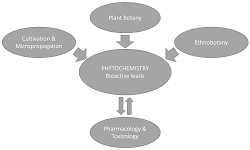
Pharmacology is a territory of science which identifies with the revelation, science, piece, recognizable proof, natural and physical impacts, uses and synthesize of medications. Pharmacology is generally mixed up for drug store, which is a calling including the readiness, and apportioning of medications. Toxicology is a branch of science, science, and medication worried about the investigation of the unfavorable impacts of chemicals on living creatures. It additionally ponders the destructive impacts of compound, natural and physical operators in natural frameworks that build up the degree of harm in living beings. The connection amongst dosage and its consequences for the uncovered life form is of high centrality in toxicology. Elements that impact synthetic poisonous quality incorporate the measurements; the course of introduction, the species, age, sex and condition.
- Experimental animal pharmacology and toxicology
- Pharmacokinetics & Pharmacodynamics
- Therapeutic drug monitoring, drug interactions
- Pharmacoepidemiology
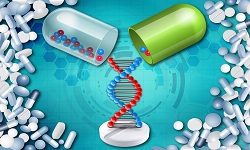
The art of Medical natural science is worried about the physical and compound qualities of qualities and their demeanor that controls the advancement and upkeep of the living being. The field of medicinal hereditary qualities is somewhat new and by and by acclimated depict the explanation for some acquired sicknesses. The illness generally prompts age of inconsistent proteins like in instances of hemophilia then very two hundred 'inalienable mistakes' of digestion are perceived in creatures, illness conditions like mannosidosis and galactosemia happen because of absence of a particular protein or chemical that denies digestion of sugars, proteins, fats and along these lines gives clinical hints.
- Clinical genetics
- Metabolic/biochemical genetics
- Cytogenetics
- Molecular genetics
- Mitochondrial genetics
Medicinal and Pharmaceutical Biochemistry:

Restorative organic chemistry is that branch of medications required with the natural chemistry and digestion of human wellbeing and infection. The restorative physicist is prepared inside the operation and administration of clinical natural chemistry labs, and goes about as a specialist on the whole parts of their utilization. The medicinal scientific expert coordinates clinical research facilities, counsels, determinations and treats patients with a scope of metabolic issue and biochemical irregularities. Medicinal natural chemistry tends to the working of customary and pathologic creatures from a biochemical motivation behind view. Through modules in Neuro degeneration, issue and restorative strength, one can build up an effective comprehension of the ramifications of natural chemistry at interims sedates on board the investigation and exploratory aptitudes.
- Protein structure and dynamics
- Forensic biochemistry
- Histopathology
- Pharmacodynamics
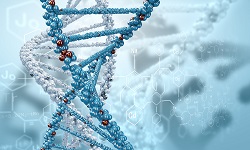
Sub-atomic science concerns the sub-atomic premise of natural action between the different frameworks of a cell, including the collaborations between the diverse kinds of DNA, RNA and proteins and their biosynthesis, and concentrates how these associations are managed. It has numerous applications like in quality finding, sub-atomic systems of sicknesses and its remedial methodologies by cloning, articulation and direction of quality. Research region incorporates quality articulation, epigenetics and chromatin structure and capacity, RNA preparing, elements of non-coding RNAs, translation. These days, most advanced examines are going on these subjects: Molecular science, DNA replication, repair and recombination, Transcription, RNA handling, Post-translational change, proteomics, Mutation, Site-coordinated mutagenesis, Epigenetics, chromatin structure and capacity, Molecular systems of maladies.
- DNA replication, repair and recombination
- Interpretation and Gene Expression
- Macromolecular Interaction
- Chemical Biology
- Protein Function
Learn More
Top Universities
USA Universities
Augusta University | Wayne State University | Penn University | University of Maryland | Drexel University | University Of Miami | University of Georgia | Harvard University | Washington University | University of Illinois | University of Minnesota | University of Charleston | West Virginia University | University of Wisconsin | University of Wisconsin | University of Washington | University of Appalachia | Duke University | University of California | University of Melbourne | University of Toronto | University of Pennsylvania | Cornell University | Yale University | University of Michiga | Washington University in St Louis | McGill University | University of North Carolina at Chapel Hill | Boston University | McMaster University | University of California | North western University | University of British Columbia | University of Pittsburgh | New York University | Emory University | Vanderbilt University | Case Western Reserve University | University of Southern California | Tufts University | Dartmouth College | University of California, Davis | University of Wisconsin-Madison | Ohio State University | University of Virginia | University of Florida
European Universities
University of Oxford | University of Cambridge | University of Copenhagen | University College London | Imperial College London | Swiss Federal Institute of Technology Zurich | University of Zurich | Karolinska Institute | University of Munich | University of Edinburgh | Pierre and Marie Curie University | Heidelberg University | University of Manchester | Catholic University of Leuven | University of Helsinki | Freie Universität Berlin | Utrecht University | Uppsala University | Wageningen University and Research Center | University of Groningen | University of Barcelona | Technical University of Munich | Leiden University | University of Basel | University of Strasbourg | Ghent University | King's College London | University of Geneva | University of Dundee | Lund University of Göttingen | University of Freiburg | Stockholm University | University of Gothenburg | University of Sheffield | Eberhard Karls University, Tübingen | University of Padua | University of Würzburg | Université Paris-Sud | University of Vienna | University of Bristol | Free University of Brussels | University of Milan | University of Amsterdam | University of Nottingham | University of Hamburg | University of Oslo | University of Leeds | University of Birmingham | University of Southampton | University of Bern | University of Cologne | Medical University of Vienna | University of Münster | University of Lisbon | University College Dublin | University of Aberdeen | University of Liverpool | Trinity College Dublin | Delft University of Technology | Bielefeld University | University of Leipzig | Cardiff University | University of York | University of Regensburg | University of Warsaw
University of Tokyo | National University of Singapore | Kyoto University | Peking University | Tsinghua University | Weizmann Institute of Science | Osaka University | Seoul National University | Shanghai Jiao Tong University | Fudan University | Zhejiang University | Tel Aviv University | Hebrew University of Jerusalem | University of Hong Kong | Tohoku University | Nanyang Technological University | Korea Advanced Institute of Science and Technology | Hokkaido University | National Taiwan University | Keio University | Shandong University | Nagoya University | Sungkyunkwan University | Yonsei University | Kyushu University | Sun Yat-sen University | Huazhong University of Science and Technology | Wuhan University | University of Science and Technology of China | Tokyo Institute of Technology | Tokyo Institute of Technology | King Abdulaziz University | National Cheng Kung University | Kobe University | Korea University | Pohang University of Science and Technology | Indian Institute of Science | Nankai University | Tongji University | King Saud University | Nanjing University | Harbin Institute of Technology | University of Tsukuba | Kyung Hee University | Sichuan University | Xiamen University | Chonnam National University | Jilin University | Central South University | University of Tehran | Aligarh Muslim University | Chinese University Hong Kong | University of Delhi | South China University of Technology | Waseda University | Okayama University | Southeast University | Soochow University | Mahidol University | Hiroshima University | Tianjin Medical University | Kanazawa University | Tehran University of Medical Sciences | Kumamoto University | Kyungpook National University | National Yang-Ming University | China Medical University
Australia & New Zealand Universities
University of Queensland Australia | University of Melbourne | University of Sydney | Monash University | University of New South Wales | University of Western Australia | University of Auckland | University of Otago | University of Adelaide | Australian National University | University of Queensland Australia
Societies & Associations
European Society for Allergy Diseases | European Society of Clinical Microbiology and Allergy Diseases | Allergy Prevention Society | British Society for Allergy | British Allergy Association | Health care Allergy Society | HIV Medicine Association | International Society for Allergy Diseases | European Society for Clinical Microbiology and Allergy Diseases | British Society for Antimicrobial Chemotherapy | Society for General Microbiology | British Association for HIV | The Hospital Allergy Society | Allergy Prevention Society | British Society for Medical Mycology | The Royal Society of Tropical Medicine and Hygiene | Royal Society for Public Health | Human Genetics Society of Australia | Genetics Society of Japan | NDC Medicine

